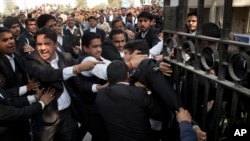Dozens of lawyers, many with links to India's ruling nationalist party, on Wednesday attacked protesters who have been demanding the release of a university student leader arrested under colonial-era sedition laws.
The clashes began shortly before a court hearing for Kanhaiya Kumar, the president of the students' union at the country's premier Jawaharlal Nehru University. The left-leaning campus leader has been in prison since Friday over his participation in events where anti-India slogans were allegedly shouted.
Soon after the clashes began, a grimacing and cowering Kumar was escorted onto the court premises on foot by a few policemen. Several reports said he was punched and kicked as he was taken inside the courtroom.
About a dozen lawyers threw rocks at reporters and protesters. One of them grabbed the camera strap of an Associated Press photographer, bruising his hand and breaking his lens. At least one reporter also said that the lawyers beat him and broke his cellphone while the police watched.
The attacks and Kumar's arrest highlighted allegations of increasing of intolerance in India since Prime Minister Narendra Modi's Hindu nationalist Bharatiya Janata Party came to power in 2014.
Kumar was arrested on a police complaint filed by a BJP-linked student faction over events where the anti-India shouts were alleged along with criticism of the 2013 secret hanging of a Kashmiri separatist convicted of an attack on Parliament.
The lawyers waved Indian flags and chanted slogans like “glory to Mother India” and “traitors leave India.” Many of the lawyers seen on television footage Wednesday had been involved in similar violence Monday when reporters and Kumar's supporters were beaten outside the court premises.
The violence occurred despite the Supreme Court ordering the police to ensure security ahead of Wednesday's hearing. Delhi Police chief B.S. Bassi said police were trying to identifying those involved in the violence, but no arrests have been made despite several newspapers naming the lawyers and publishing their photographs prominently.
India's sedition laws were drafted by its British colonial rulers to suppress the country's freedom struggle, and the Supreme Court has said in recent years the laws should be invoked only when there is actual evidence of incitement to violence.
The trouble on the campus of the university, prestigious and known for students' political activism, followed a Feb. 9 event marking the anniversary of Afzal Guru's execution. Some human rights activists and most Kashmiris in the Indian-controlled portion of the region believe he was not given a fair trial.
The campus dispute escalated sharply when senior government ministers waded into it. The home minister, Rajnath Singh, tweeted that anyone shouting anti-India slogans “will not be tolerated or spared,” and Human Resource Minister Smriti Irani told reporters that “the nation can never tolerate an insult to Mother India.”
Since the arrest of Kumar, the student leader, last week, students and faculty have staged sporadic protests demanding his release and accusing the government of crushing all dissenting voices.
Niamkoi, a PhD student who uses just one name, said the random police questioning of students left many feeling intimidated.
Indian newspapers have published scathing editorials about the government's disproportionate response to an event on the university campus.
Political analyst Neerja Chowdhury described the government response as, “using an AK-47 to swat a fly.”
“If you don't question assumptions in university how are new ideas going to come about?”
Lawyers Clash With Protesters in India Over Student's Arrest
update

NEW DELHI —



